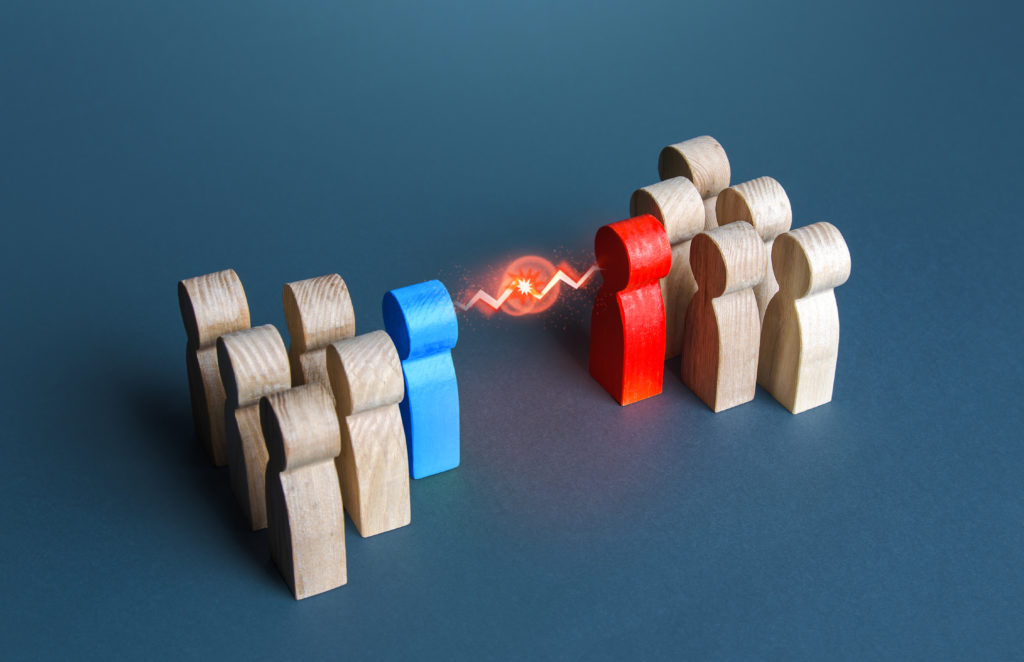Quick Hits
Daily brief research updates from the cognitive sciences

Us vs. them is known as in-groups vs. out-groups in psychology. This is the well-known effect of people being loyal to their own groups and being competitive and often aggressive to the out-group. This happens in multiple groups. Obvious ones are nationalities, religious groups, sports teams, but also geographical regions.
Previous research has shown that we human beings are very good at creating groups and this can be formed very quickly. We also know that these groups, at extreme levels, can be the cause of much of what we consider evil in society, aggression, abuse, murder, torture, and genocide. What may also be surprising, to some, is that all evidence points to this being hardwired i.e. babies as young as 3-months-old exhibit favouritism to in-groups and out-groups and this includes punishing the out-group and rewarding the in-group!
Now researchers at the Virginia Commonwealth University have investigated this effect further and come to some surprising, to some, conclusions!
What did they find?
They put 35 male college students through online competitive aggressive tasks. For this they told they would be competing with participants from a rival university. In fact, they competed against a computer – for ethical reasons. They had their brains scanned while doing these tasks.
What they found that was surprising is that those who were more aggressive against out-group members had greater activation of reward circuits in the brain suggesting that this is driven be reward rather than anger or other mechanisms. Specifically, the nucleus accumbens and ventromedial prefrontal cortex.
This reward circuitry was also associated with the mount they excluded the out-group from other activities. Though this has been measured in other contexts and the research points to this rewarding experience the researchers were most surprised by the strength of the effect in what is a “weak” out-group. A rival university is, in the big scale of things, not a very strong out-group such as the ones that are constructed in a divisive political atmosphere or on the global stage.
So sad to say that reward for punishing others seems to drive, to a large extent, in- and out-grouping and harming others. Fortunately, we now know this and fortunately not everybody exhibits this to excessive degrees●

Andy Habermacher
Andy is author of leading brains Review, Neuroleadership, and multiple other books. He has been intensively involved in writing and research into neuroleadership and is considered one of Europe’s leading experts. He is also a well-known public speaker speaking on the brain and human behaviour.
Andy is also a masters athlete (middle distance running) and competes regularly at international competitions (and holds a few national records in his age category).
Reference
Emily Lasko, Abigale C Dagher, Samuel James West, David Chester.
Neural Mechanisms of Intergroup Exclusion and Retaliatory Aggression.
Social Neuroscience, 2022
More Quick Hits
Brain Scans Can Predict Your Political Affiliation
Quick HitsDaily brief research updates from the cognitive sciences rain scanning of political partisans is not new and it has long been reported that brain scans can predict political affiliation. But those studies were scans of political partisans...
Children with Same-Sex Parents Are Socially Well-Adjusted
Quick HitDaily brief research updates from the cognitive sciences his is not the first study to report that children of same-sex parents are well adjusted, there are plenty, but it is one of the first to be representative and hence gives some...
Simple Exposure to New Things Makes Your Brain Ready to Learn
ouldn’t it be great if we could learn things with no effort? Well, actually we often do, and children learn vast quantities of information, and knowledge with little to no effort – think of how well we learn languages which become fiendishly...
So, Can Cranberries Improve Memory?
tend to be hesitant to report on studies of single foods doing amazing things (because many do), but this piece of research still caught my eye. So, what did this group of researchers from the University of East Anglia find? Well, they...
The Real Problem with Social Media: It Induces Dissociative States
Quick HitsDaily brief research updates from the cognitive sciences ocial media seems to hijack our brains – or at least according to popular narratives. Most of us have experienced this where you get stuck in an endless stream of content,...
Adventurous Play Boosts Mental Resilience in Kids
o, a simple cheap way to help your kids improve all life skills and strengthen mental wellbeing. Too good to be true? Well, this piece of research, just out, finds a fascinating correlation with mental health and kids. This correlation was...






